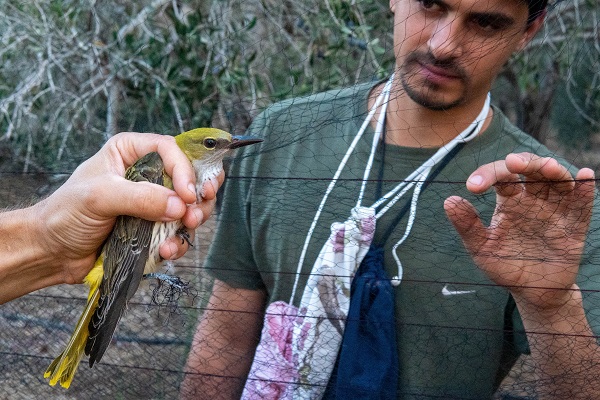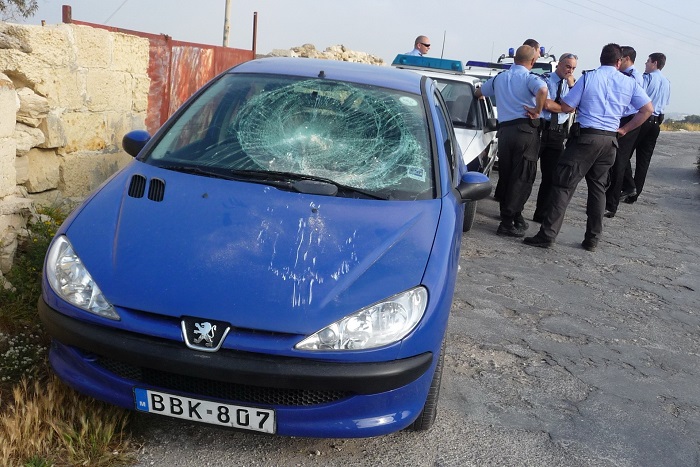Our bird protection camps

Actions against poaching
Bird protection camps are a central part of CABS' work. In collaboration with local partner NGOs, our members and volunteers conduct field investigations to search for for illegal wild bird traps and hunting equipment in the poaching hotspots of the Mediterranean. Our teams also monitor migration bottlenecks and roosting areas, where migratory birds are targeted by poachers. We aim to gather evidence to facilitate the apprehension of poachers by the police.
However, the plan of action varies depending on the area of operation. For example, in Brescia, northern Italy, CABS teams search for active traps and bring police officers to the sites. Poachers are apprehended during the control of these devices. On Malta, CABS teams take position to monitor and film known hunting hotspots; their visible presence suffice to prevent poaching of migratory birds, especially raptors. If anyone attempts to kill a protected bird, they will immediately be reported to the police.

In Cyprus, on the other hand, the limesticks are collected by CABS members because there is a lack of proper police support. If we find birds of prey trapping installations in Germany, we film and catch the perpetrators in the act. In Lebanon, our bird protection camps are more like war reports - the main thing here is to document the extent of poaching and to improve public awareness of the problem through reports, press releases and videos.
Our bird protection camps are not simply about collecting traps and bringing poachers to justice. With our targeted public relations work, we deter other perpetrators. Thus, we sometimes save more birds with a newspaper article about a convicted poacher, than by collecting traps and nets.
The most important operations
Bird trapping and hunting occurs all over Europe. However, along the three migratory routes there are well known and established hotspots.
Our current 26 operations take place here:
- Bird protection camps in Malta: 5 operations per year (shooting and trapping)
- Bird protection camps in Cyprus: 3 operations per year (trapping)
- Bird protection camps in Lebanon: 2 operations per year (shooting and trapping)
- Bird protection camps in Brescia: 3 operations per year in Brescia, Italy (shooting and trapping)
- Bird protection camps in Bolzano, 1 operation per year in Bolzano, Italy (Nest robbers)
- Bird protection camps in Po Delta, 1 operation per year in the Po Delta, Italy (wader hunting)
- Bird protection camps in Sardinia, 1 operation per year (trapping)
- Bird protection camps in Ponza und Palmarola, Italy, 2 operations per year (shooting and trapping)
- Bird protection camps in Ischia, 1 operation per year on Ischia, Italy (trapping)
- Bird protection camps in Calabria, 2 operations per year in Calabria, Italy (trapping and raptor hunting)
- Bird protection camps in Sicily, 1 operation per year on Sicily (Bonelli eagle persecution)
- Bird protection camps in Serbia, 1 operation per year (quail hunting)
- Bird protection camps in Spain, 2 operations per year (trapping)
- Bird protection camps in Southern France, 1 operation per year (Ortolan trapping)
Dangerous work

Our actions are not without danger. Poachers are usually armed and they often have criminal intent. Although very few of them are dangerous, if their lucrative business or "old tradition" is at risk, some individuals may lose control. We face insults and threats on a daily basis during bird protection camps.
It becomes particularly dangerous when poachers call for other individuals' support. In Malta and Cyprus, we had many incidents arising from group dynamics. CABS members have been assaulted and our vehicles are frequently damaged.
Video "The Bird Guards" - WATCH our anti-poaching operations in Lebanon
To view videos via YouTube, "External Media" must be allowed.
You can go to the privacy settings again here and allow External Media.
Volunteers wanted!
Our bird protection camps are only possible with the help of our many Bird Guard volunteers. Each year, between 250 and 300 nature and animal lovers from all over Europe take part in our operations. Anyone who is physically fit, courageous, with a good team spirit and able to speak English, can take part. Other requirements vary from camp to camp. For example, you have to be very fit physically to join the bird protection camp in Northern Italy, good bird identification skills are necessary in Malta and a good dose of courage in Cyprus.
You can find more information about the conditions of participation here.






